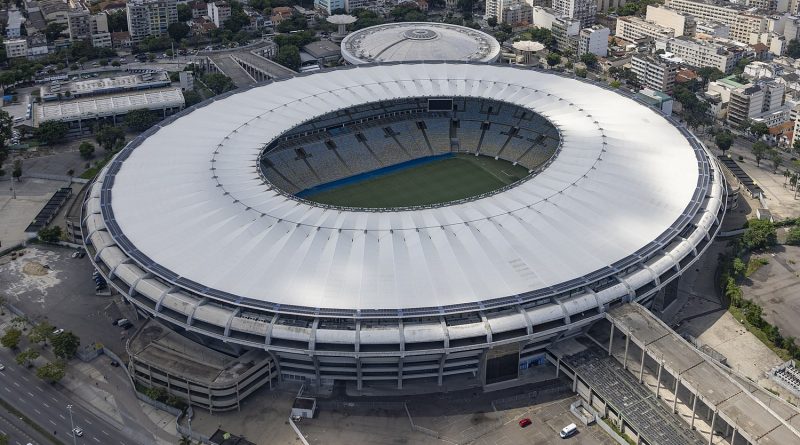A Continent’s Obsession: Inside the Copa Libertadores
Jaime Halstuch
Staff Writer
South America vibes to a single melody, Y Dale Dale Alegria a Mi Corazon by Fito Paez. This melody is sung in almost every first division stadium in South America under the name La Copa Libertadores Es Mi Obsesion. Boca Juniors will face Fluminense at Maracanã in Rio de Janeiro for the Copa Libertadores Final on November 4th. Will it be Boca’s seventh title to tie Independiente for the most titles or will Fluminense make the trophy stay one more year in Rio and win their first Copa Libertadores? No one can be sure of what is going to happen, they are two very different teams in every way possible, and Boca is a very unpredictable team. We may be about to watch one of the most massive amounts of away fans traveling for a game. But before talking about the fans, it is important to talk about the teams.
Fluminense is without a doubt the best team on the continent, a team that could compete with most

European teams. The reincarnation of Joga Bonito, “football champagne” is the perfect definition. “Football champagne” refers to a style very pleasurable to watch, an exciting style that is just pretty. Commanded by Fernando Diniz, who also serves as a coach for the Brazilian men’s national team, they are a team that likes to propose and take control of the game. “The Flu” is incredibly superior when it comes to names, even on the bench. Starting with the defense, Marcelo is a 5-time UCL winner with Real Madrid at LB and a natural leader; he exhibits leadership, quality, and experience in one player. Felipe Melo is an old school CB, he knows how to play the Copa Libertadores, great center back; however, he is best known for being a master in hitting and not getting caught, and when he hits, he hits hard. Nino and Samuel Xavier are two experienced players that will complete the back 4. At 43 years old Fabio is the main GK and is likely to be a starter on November 4th. Fluminense plays either with a 4-1-3-2 or a 4-2-3-1 formation. The main starter in that first line of the midfield is Andre, a young and smart player, great first touch. When that line has two, Andre shares the line with either Alexsander or with Martinelli. Alexsander is a more defensive player while Martinelli is a more offensive player, this line can tell us a lot of what Diniz will want to do in the game. The second line of midfielders is the same most of the time, from left to right: Keno, Paulo Henrique Ganso, and Jhon Arias. Keno is the stereotypical Brazilian winger; he knows all the tricks in the book. Ganso was Neymar’s main partner in the Santos that won Copa Libertadores in 2011. Ganso is the brain of this team, the one that dictates the tempo, an old school #10. Arias is surprisingly great on defense, he is a really good time and space manager; on top of that whenever he is having a good day, he can be one of the best dribblers in the continent, and he is one of German Cano’s best partners. The main striker is German Cano, he scores, and he is just too good at it, he has 12 goals in 9 games played during this edition. A true killer in the box, any goalkeeper’s nightmare, and without a doubt the best sticker in the continent and in the world. Fluminense will be the one to set the rhythm in the game with their offensive and propositional game.
It is hard to talk about Boca’s playing style, no one knows what Boca’s style is. However, Boca does have

something Fluminense does not, mysticism. Israel Damonte said on ESPN “If Boca plays well, they will beat you, if they don’t play that well maybe they will beat you, but if they play bad, they will beat you.” And it is hard to explain why and how, but it is true. Jorge Almiron took the coaching job in Boca and since he started, he has been criticized in most of his decisions, especially with the substitutions he makes during games. In the Primera Division tournament Boca has won three games, tied one, and lost six. Boca, just like Fluminense, is a mix between experience and youth. It is hard to know what is going to be the starting line up for Boca in the final, but it will probably be 4-4-2. In goal, the former Manchester United player Sergio Romero who was also the GK for the Argentinian national team in 2014 and took them to the World Cup final. A clutch player and a penalty specialist, Boca has gone to penalty shootouts in every round of the playoffs, and he has saved two penalties in every shootout. The defense also has a lot of experience. Frank Fabra will play LB; he is an experienced player that has played for Boca for 8 years. Luis Advincula plays RB, also an experienced player, and he has European experience. Both fullbacks are top class, they like to join the attack taking advantage of their speed and they have no problem when it comes to finishing, they are also good defenders, their main weakness is that they get distracted sometimes and make rookie mistakes. The attacking pair is the Uruguayans Miguel Merentiel and the former Manchester United, PSG, Napoli, and Valencia player Edinson Cavani. Cavani is extremely efficient, but he has two main problems. He does not get that many chances and sometimes he plays as a #10 away from the box, which does not allow him to finish in the box. He is great with one touch finishing, headers, and positioning inside the box. Merentiel is a great second striker since he is good at doing the dirty jobs Cavani does not do. It is a team with a lot of personality and a hardworking team. Boca will try to take advantage of every time that they have and if not, they will try to take it to penalty shootouts. Boca’s experience and ability makes them one of the best teams when it comes to shootouts.
This game is special, and the fans of each team will have a large impact on the end result. The final will be played in Rio de Janeiro, Fluminense’s home city, in the Maracanã stadium Fluminense’s stadium. But since the venue was decided before the competition started, Maracanã must be a neutral venue. So, both Fluminense and Boca fans will have the same number of tickets for sale, at least 20,000 tickets each, the other approximately 40,000 tickets will be divided between other fans and sponsors.
Finals are not only a physical but also a mental game and that is where fans come in. El Grafico estimates that 150,000 Boca fans will travel to Rio for the final, that is 130,000 more fans than tickets given to the club. Just to put it into perspective, Argentina is estimated to have had a little bit over 165,000 fans in the FWC Brazil 2014 (EMBRATUR), and 35,000 in Qatar 2022 (Guillermo Nicolas, Argentinian Ambassador for Qatar). The FIFA World Cup is a month long, and not all the fans are there at the same time. Here we are talking that 150,000 fans are traveling for a single team and not a country, for one game, not 3 (least number of games a country can play in a FWC). Things like this have inspired Boca Juniors fans to call themselves the biggest popular movement in the world. In Rio we will see South American soccer in its purest form. Fans from both teams will go to both teams’ camp and try to cheer their players and give the other team’s players a bad rest during the nights before the game. Fluminense has the advantage that their fans do not have to travel, and the local law enforcement could have better treatment of them, like it normally happens with home fans in soccer. Fluminense may not be the biggest fan base in Brazil, and it may be smaller than Boca’s, but it is still thousands of fans who will not disappoint.
Fluminense’s fans trust their coach, their team, and their playing style to win the final. Boca’s fans on the other hand trust their players but not their coach or their playing style. Boca’s fans trust in G-D, in Maradona helping the team from heaven just like he did for Argentina in the World Cup, in their squad, in their power to get in the Fluminense player’s head, and above all in the coincidences. France lost the WC final in 2006, Boca won Copa Libertadores 2007, France lost the WC Final in 2022. In 2002 a South American team, Brazil, won the WC, Boca won Copa Libertadores in 2003, in 2022 another South American team, Argentina wins the WC. Lula da Silva (Brazil’s president) took office in 2003 and 2007 years in which Boca won the tournament, he took office again in 2023. In all the editions Boca has won this century they never played a Brazilian team in the group stage; they did not do it this year either. Both Carlos Bianchi and Miguel Angel Russo, who won the Copa Libertadores with Boca as coaches won it when they were 52 years old, same age as Jorge Almiron the current coach.
The only thing I can assure you about the game is that it is going to have a great ambience. Rio will be a carnival. We have two historic teams, both with a historic opportunity, in a historically great soccer city and country and both teams extremely hungry to get eternal glory. This is soccer and anything can happen, miracles are possible. Remember the game is at 4:00 pm ET on Saturday November 24th.
Boca Juniors vs Fluminense fighting for a continent’s obsession. Who will it be?
Contact Jaime at jaime.halstuch@student.shu.edu

